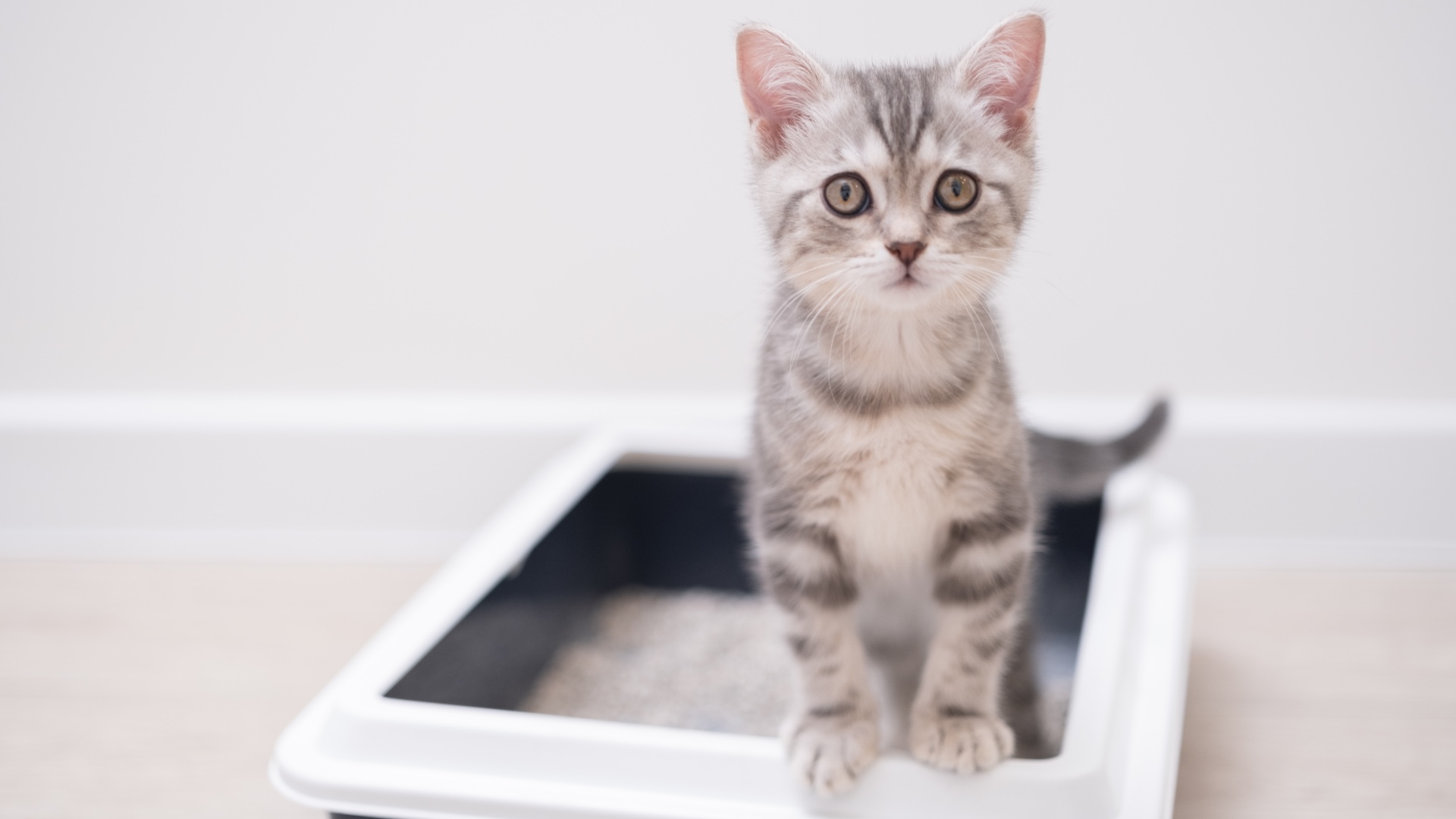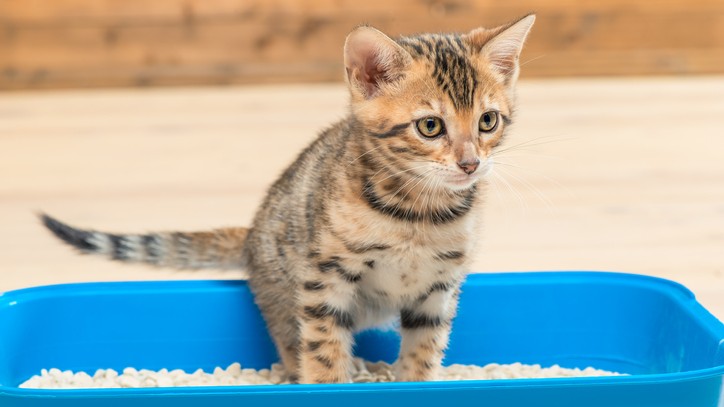Here’s how to help a kitten with diarrhea, according to a vet
Looking for information on how to help a kitten with diarrhea? This simple advice from a vet is well worth following

While it may not be the most pleasant of topics, knowing how to help a kitten with diarrhea is something you’re going to want to be aware of if you have a little feline friend in your home. In many cases, diarrhea in kittens is very mild and will often resolve itself within a day or two, however, in some instances, it can be severe.
The causes of diarrhea in kittens vary, but it can often be a result of something very simple — like swapping them over from the best kitten food in wet form to a dry food diet. There are also several types of infections that can have diarrhea as a symptom, and don’t rule out stress, which is a big contributing factor to loose stools in young kitties.
Whatever the cause, prolonged diarrhea can lead to dehydration, and just like kitten constipation, it’s always advisable to get your little one checked over by a vet if they’ve been displaying symptoms for longer than 24-48 hours.
Below, Dr. Catherine Barnette talks you through the most common causes of diarrhea in kittens, plus she explains how you can care for your kitten at home and the various treatments your vet may recommend. Let’s take a look…

Animal lover and expert Dr Barnette graduated from the University of Florida, where she received both her B.S. in Zoology and her Doctor of Veterinary Medicine (DVM). In total, Dr Barnette has more than 15 years of clinical experience as a small animal veterinarian, looking after dogs, cats, and occasional exotic patients. In more recent times, Dr Barnette brings her decades of knowledge to a wider community, working as a freelance veterinary writer, and publishing expert-led content for fellow vets and pet parents. Dr Barnette lives with her husband and daughter (plus two cats, a dog, and a rescued dove!) in Florida.
Possible causes of kitten diarrhea
Kitten diarrhea can have a number of possible causes, ranging in severity from mild and easily-treated to potentially fatal. In most cases, determining the underlying cause of your kitten’s diarrhea will require the help of a veterinarian. However, it can be helpful for cat owners to have a general understanding of the common causes of diarrhea in young kittens.
Although everyone wants to give their young cat the best kitten food they can, in some cases, diarrhea may be caused by something as simple as a diet change. Perhaps you recently adopted a stray kitten from an animal shelter. In that case, there’s a good chance that you are not feeding the kitten that same diet they were receiving in the shelter. It’s also possible that the kitten may have had several diet changes before arriving at your home. These nutritional changes can result in diarrhea for many kittens.
Many cases of kitten diarrhea have an infection or contagious disease as their underlying cause. Common infectious causes of diarrhea in kittens include:
Get the best advice, tips and top tech for your beloved Pets
- Intestinal worms (hookworms, roundworms)
- Protozoal parasites (giardia, coccidia)
- Viral infections (feline panleukopenia, feline distemper virus)
- Bacterial infections
Even stress can cause diarrhea in kittens, so this could potentially be a factor if your kitten is a new addition to your home and has recently undergone big life changes. Rarely, diarrhea in kittens may be caused by an anatomic abnormality, such as a malformed rectum or colon.
Home care for kitten diarrhea
It’s not uncommon for a kitten to have bowel movements that are slightly softer than those produced by an adult cat. If this is the case, and you know your fur friend is up to date on their cat and kitten vaccinations, deworming, and other veterinary preventative care, you may opt to try some home care for your kitten’s diarrhea. During this time, it’s important to monitor your kitten closely to ensure that the diarrhea doesn’t worsen and that your kitten does not develop any other signs of illness.
Ensure that you are feeding high-quality kitten food. Feed your kitten the same food every day instead of frequently switching between brands and flavors of kitten food. If you do need to change your kitten’s diet, do so gradually over a period of one week. If your kitten’s diarrhea has been caused by an abrupt change in diet, you can expect that it will probably resolve (or at least show significant signs of improvement) within several days of being on a consistent, high-quality diet.
Do not give your kitten any human medications to treat their diarrhea. Human medications, such as PeptoBismol® and Imodium®, can have significant side effects in kittens and often cause more harm than good.
And while we're on the subject of things to avoid, can kittens drink milk? It's important to avoid feeding milk to any kitten, but especially a kitten with diarrhea. Kittens are lactose-intolerant, so feeding even small amounts of milk could lead their diarrhea to become significantly worse. If your kitten is reluctant to eat or drink, seek a veterinarian’s assistance instead of offering milk or other home remedies.
When should your kitten see a veterinarian?

'Is my cat sick?' is a question you may be asking if your kitten is experiencing diarrhea. Many kittens with diarrhea will ultimately require veterinary care. Due to their small size, kittens can rapidly become dehydrated and/or hypoglycemic if they are experiencing severe or continued diarrhea.
If your kitten is not up-to-date on preventive care, including vaccinations and deworming, a veterinary visit is especially essential. Many kittens are born with intestinal worms; your veterinarian can diagnose and treat these worms. Kittens are also susceptible to a number of diarrheal illnesses that can be prevented with vaccines, so appropriate vaccination is an essential step in preventing kitten diarrhea.
In a kitten that is up-to-date on all recommended veterinary preventive care, signs that veterinary attention may be needed include vomiting, lethargy, decreased appetite, blood in the stool, and/or very loose diarrhea. All of these suggest a scenario in which your kitten is at high risk of dehydration and other significant complications of diarrhea. If you are unsure whether your kitten needs veterinary attention, call your veterinarian.
Your veterinarian will begin by performing a thorough physical examination of your kitten. Next, your veterinarian is likely to recommend a fecal parasite examination, in which your kitten’s stool is examined under a microscope to look for intestinal worm eggs and protozoa. If parasites are found on the fecal examination, your veterinarian will prescribe medications to treat the parasites. If your kitten’s fecal examination is free of parasites, your veterinarian will likely prescribe medications intended for symptomatic treatment, such as anti-diarrheal medications and/or a probiotic. Your veterinarian may also send you home with a bland diet that is intended to be high in energy and easy on your kitten’s digestive system. If your kitten is severely dehydrated, your veterinarian may also recommend hospitalizing your kitten for intravenous (IV) fluid therapy.
While most kittens improve significantly with treatment, a small percentage of kittens may develop diarrhea that persists for weeks or longer. In the case of chronic diarrhea, your veterinarian may recommend more aggressive testing to look for less common underlying conditions.
Diarrhea treatment depends upon severity
When questioning how to help a kitten with diarrhea, the first priority is to determine how severe the diarrhea appears to be. If your kitten has had a few episodes of slightly soft stool, and is otherwise up to date on veterinary care, you can likely monitor your kitten at home while feeding a consistent, high-quality diet. If your kitten is experiencing severe diarrhea, lethargy, vomiting, or other signs of illness, however, you need to seek veterinary care as soon as possible to prevent dehydration and other significant complications.
For more helpful content to help your kitty thrive in the first year of life, check out this vet's top six kitten care tips.
Dr. Barnette is a graduate of the University of Florida, where she received both her B.S. in Zoology and her Doctor of Veterinary Medicine (DVM). She has 15 years of clinical experience as a small animal veterinarian, treating dogs, cats, and occasional exotic patients. She now works as a freelance veterinary writer, creating educational content for veterinarians, veterinary team members, and dedicated pet owners. Dr. Barnette lives in southwest Florida with her husband and daughter (plus two cats, a dog, and a rescued dove!) and enjoys kayaking, biking, and hiking. Learn more about Dr. Barnette at www.linkedin.com/in/catherinebarnette.

